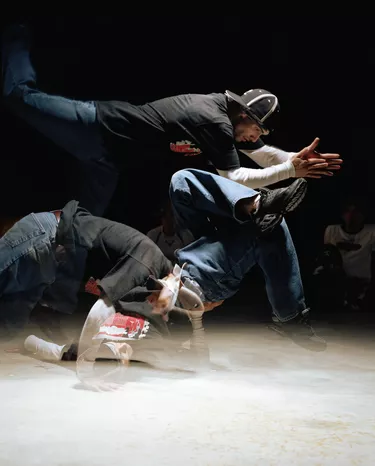
You see them in the background of music videos. They decorate the stage at pop music and hip-hop concerts. They are hip-hop dancers, highly-trained and underpaid. The salary of a hip-hop dancer varies based on the type of performance, length of time they will perform or tour on the road -- and if the production is governed by any performer unions.
According to the Bureau of Labor Statistics, $12.22 was the median hourly wage for dancers in 2008, with the top earners pulling in more than $26 per hour. The bottom tenth percentile earned little over minimum wage. Dancers get very irregular work and most dancers must supplement their income with teaching, choreography, dance company administration and a variety of other non-dance jobs.
Video of the Day
Video of the Day
Music Video Pay
Music video pay scales for dancers are determined by the production's union signatory status. Most medium and low-budget music videos are non-union. Non-union music videos may pay hourly or give you a daily buyout rate. Daily buyout rates commonly range from $200 to $500 or more per day, depending on the number of hours you will spend in rehearsal and on the set, as well as how featured your performance in the music video will be.
Live Music Performances
Local and regional hip-hop music artists that perform once or twice a month commonly pay their dancers $30 to $80 per performance. This amount can go up based on the length of the performance, if the dancers are required to provide their own wardrobe or if they have to travel out of town for the show.
Other Live Performances
Hip-hop dancers that perform under an Actors Equity Association contract -- the union for theatre performers -- will earn a minimum of $1,653 per week as of 2009. Contracts will vary based on the length of the tour and the celebrity level of the dancers -- if they have appeared in any television shows or music videos, for example. Since most dance troupe performers are not covered by any unions, the pay for performing with them can fluctuate greatly and is usually based on ticket sales.
Considerations
As a hip-hop dancer, there will often be times when you are offered work with no pay. This is especially true early on in your dance career, when you are transitioning from other styles of dance such as ballet or jazz, or when performing with small productions and newer dance troupes. Taking the non-paying gigs will help to show your professionalism and allow you to network, so don't avoid a gig just because it doesn't pay you what you were hoping for.